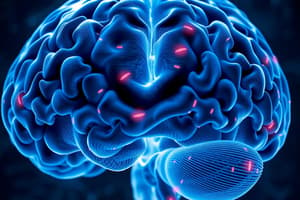Podcast
Questions and Answers
What is the term used to describe mental disorders that are caused by a medical condition?
What is the term used to describe mental disorders that are caused by a medical condition?
Mental Disorders Due to Another Medical Condition
What are the two key features of delirium?
What are the two key features of delirium?
- Changes in mood and behavior
- Hallucinations and delusions
- Disturbance in attention and reduced awareness of the environment (correct)
- Impairment in cognitive function and memory loss
Delirium always develops gradually over a period of several days or weeks.
Delirium always develops gradually over a period of several days or weeks.
False (B)
Which of the following is NOT a criterion for diagnosing delirium?
Which of the following is NOT a criterion for diagnosing delirium?
What are the three main types of psychomotor activity in delirium?
What are the three main types of psychomotor activity in delirium?
What is the most common age and sex demographic associated with delirium?
What is the most common age and sex demographic associated with delirium?
What is the process of determining the differential diagnosis for delirium?
What is the process of determining the differential diagnosis for delirium?
Which of the following is NOT a core principle of delirium management?
Which of the following is NOT a core principle of delirium management?
The underlying causes of delirium can be categorized into central nervous system and outside the central nervous system.
The underlying causes of delirium can be categorized into central nervous system and outside the central nervous system.
Which of the following is NOT a potential precipitating factor for delirium?
Which of the following is NOT a potential precipitating factor for delirium?
What are the most common types of medication that can precipitate delirium?
What are the most common types of medication that can precipitate delirium?
Environmental factors like ICU admission, physical restraints, bladder catheters, and emotional stress can contribute to delirium.
Environmental factors like ICU admission, physical restraints, bladder catheters, and emotional stress can contribute to delirium.
What is the key difference between major neurocognitive disorder and minor neurocognitive disorder?
What is the key difference between major neurocognitive disorder and minor neurocognitive disorder?
The subtypes of major neurocognitive disorder include Alzheimer's disease, vascular disease, traumatic brain injury, substance/medication use, HIV infection, Prion disease, Parkinson's disease, Huntington's disease, another medical condition, multiple etiologies, and unspecified etiology.
The subtypes of major neurocognitive disorder include Alzheimer's disease, vascular disease, traumatic brain injury, substance/medication use, HIV infection, Prion disease, Parkinson's disease, Huntington's disease, another medical condition, multiple etiologies, and unspecified etiology.
Which of the following is NOT a common psychotic feature seen in Neurocognitive Disorders?
Which of the following is NOT a common psychotic feature seen in Neurocognitive Disorders?
What are some common behavioral symptoms associated with neurocognitive disorders?
What are some common behavioral symptoms associated with neurocognitive disorders?
Sleep disturbances in neurocognitive disorders are typically characterized by hypersomnia and circadian rhythm disturbances.
Sleep disturbances in neurocognitive disorders are typically characterized by hypersomnia and circadian rhythm disturbances.
What is the overall goal of management for neurocognitive disorders?
What is the overall goal of management for neurocognitive disorders?
Flashcards
Delirium
Delirium
A disturbance in attention and awareness, characterized by reduced ability to focus, sustain, and shift attention, along with decreased awareness of the environment.
Hyperactive Delirium
Hyperactive Delirium
This is a symptom of delirium where the individual exhibits heightened psychomotor activity, potentially with mood swings, agitation, and resistance to care.
Hypoactive Delirium
Hypoactive Delirium
This is a symptom of delirium characterized by sluggishness, lethargy, and a slowed mental state that may border on stupor.
Mixed Level of Activity in Delirium
Mixed Level of Activity in Delirium
Signup and view all the flashcards
Underlying Causes of Delirium
Underlying Causes of Delirium
Signup and view all the flashcards
Precipitating Factors of Delirium
Precipitating Factors of Delirium
Signup and view all the flashcards
Environmental Factors Contributing to Delirium
Environmental Factors Contributing to Delirium
Signup and view all the flashcards
Differential Diagnosis of Delirium
Differential Diagnosis of Delirium
Signup and view all the flashcards
Management of Delirium
Management of Delirium
Signup and view all the flashcards
Major Neurocognitive Disorder (NCD)
Major Neurocognitive Disorder (NCD)
Signup and view all the flashcards
Subtypes of Major NCD
Subtypes of Major NCD
Signup and view all the flashcards
Minor Neurocognitive Disorder
Minor Neurocognitive Disorder
Signup and view all the flashcards
Psychotic Features in Neurocognitive Disorders
Psychotic Features in Neurocognitive Disorders
Signup and view all the flashcards
Mood Disturbances in Neurocognitive Disorders
Mood Disturbances in Neurocognitive Disorders
Signup and view all the flashcards
Agitation in Neurocognitive Disorders
Agitation in Neurocognitive Disorders
Signup and view all the flashcards
Behavioral Symptoms in Neurocognitive Disorders
Behavioral Symptoms in Neurocognitive Disorders
Signup and view all the flashcards
Sleep Disturbances in Neurocognitive Disorders
Sleep Disturbances in Neurocognitive Disorders
Signup and view all the flashcards
Apathy in Neurocognitive Disorders
Apathy in Neurocognitive Disorders
Signup and view all the flashcards
Management of Neurocognitive Disorders
Management of Neurocognitive Disorders
Signup and view all the flashcards
Treatment Options for Neurocognitive Disorders
Treatment Options for Neurocognitive Disorders
Signup and view all the flashcards
Cognitive Enhancement Therapy (CET)
Cognitive Enhancement Therapy (CET)
Signup and view all the flashcards
Behavioral Activation
Behavioral Activation
Signup and view all the flashcards
Environmental Adjustments in Neurocognitive Disorders
Environmental Adjustments in Neurocognitive Disorders
Signup and view all the flashcards
Routine and Schedules for Neurocognitive Disorders
Routine and Schedules for Neurocognitive Disorders
Signup and view all the flashcards
Sleep Hygiene for Neurocognitive Disorders
Sleep Hygiene for Neurocognitive Disorders
Signup and view all the flashcards
Encouraging Independence in Neurocognitive Disorders
Encouraging Independence in Neurocognitive Disorders
Signup and view all the flashcards
Sensory Aids for Neurocognitive Disorders
Sensory Aids for Neurocognitive Disorders
Signup and view all the flashcards
Activating Social Support for Neurocognitive Disorders
Activating Social Support for Neurocognitive Disorders
Signup and view all the flashcards
Care for General Health in Neurocognitive Disorders
Care for General Health in Neurocognitive Disorders
Signup and view all the flashcards
Care for Caregivers in Neurocognitive Disorders
Care for Caregivers in Neurocognitive Disorders
Signup and view all the flashcards
Study Notes
Organic Psychiatry (Past Term)
- Delirium is a condition with reduced attention, awareness fluctuations, and cognitive issues like memory problems or disorientation, sometimes developing over hours or days.
- Neurocognitive Disorders (NCDs) involve a decline in multiple cognitive areas.
- NCDs begin with delirium and are followed by subtypes like major NCD and mild NCD, each with possible etiological subtypes.
- Alzheimer's disease, vascular disease, Lewy body disease, Parkinson's disease, traumatic brain injury, HIV infection, Huntington's disease, substance/medication and prion disease are some potential causes of NCD.
- Delirium is characterized by attention problems, decreased environmental awareness, and rapidly changing severity throughout the day.
- It's not linked to another disorder or a severe reduction in alertness like coma.
- A medical cause must be present for delirium, such as toxin exposure, medication side effects, or a medical condition.
- Delirium can have different levels: acute (lasting a few hours or days) or persistent (weeks or months).
- Hyperactive delirium includes high psychomotor activity and irritability.
- Hypoactive delirium involves low activity levels, slow movement, and a stupor-like state.
- Gender differences in delirium can be observed, with men often experiencing more motor agitation and affective lability, whereas women might exhibit hypoactive delirium.
- Underlying Causes of Delirium: may arise from central nervous system issues (e.g., neurodegeneration, cerebrovascular problems, infections, inflammation, tumors, demyelination, epilepsy, trauma) or from outside the central nervous system aspects (e.g., endocrine problems, metabolic diseases, nutritional issues, infections).
- Infections, hypoxia, and other acute disorders, kidney/liver disorder, urinary retention, constipation, anemia, and fever can be factors leading to delirium. Also, specific events such as shocks can be contributing.
- Age at or over 65, male gender, vision/hearing issues, dehydration/malnutrition, medication use (especially multiple), alcohol use, immobility, pain, and sleep deprivation are contributing factors to delirium.
- Delirium is related to several medical conditions, such as surgery, medication overdose, sedative/hypnotic/anticholinergic/antiepileptic drugs, ICU situations (with physical restraints, bladder catheters, and emotional stress).
- Other conditions to rule out when examining delirium include psychotic disorders, acute stress disorder, malingering, and factitious disorders.
Neurocognitive Disorders (NCDs)
- Differentiating NCDs from other disorders is important. The presence of distinct criteria help in proper diagnosis.
- Major NCDs involve substantial cognitive decline affecting everyday tasks.
- Minor NCDs display a milder cognitive decline, often not interfering substantially with daily tasks.
- Diagnostic Criteria for NCDs include significant cognitive decline in multiple areas (attention, memory, language), substantial impairment, interference with independent daily activities, and those that aren't due to other issues, such as severe depression.
- Various potential causes for NCDs have been listed.
- Specifiers like "without behavioral disturbance" or "with behavioral disturbance," and severity (mild, moderate, severe) factors are used to classify and categorize NCDs.
Management of Delirium
- Management includes securing a comfortable and well-lit space for patients, thoroughly investigating and treating the root cause, and considering atypical antipsychotic and benzodiazepine medications possibly with physical restraints.
- Additional management procedures may include EEG, CT, MRI scans, and psychological testing (MMSE), risk assessments, and evaluation of support systems.
- Potential causal treatments include nootropics/neuroprotective supplements, pain management (paracetamol), acetylcholinesterase inhibitors, glutamate antagonists, and other symptom-relieving medications (anti-anxiety, antidepressant, antipsychotics) considering comorbidities.
- Effective strategies include cognitive enhancement therapy, behavioral activation, environmental adjustments (safety measures), sleep hygiene, encouragement of independence, sensory aids, and strategies to minimize isolation and stigma while supporting care givers.
Mental Disorders Due to Another Medical Condition
- Another medical condition can cause mental health issues like psychosis, mood disorders, anxiousness, issues with sexuality, sleep difficulties, catatonia.
- Underlying medical conditions may sometimes affect personality.
Studying That Suits You
Use AI to generate personalized quizzes and flashcards to suit your learning preferences.




